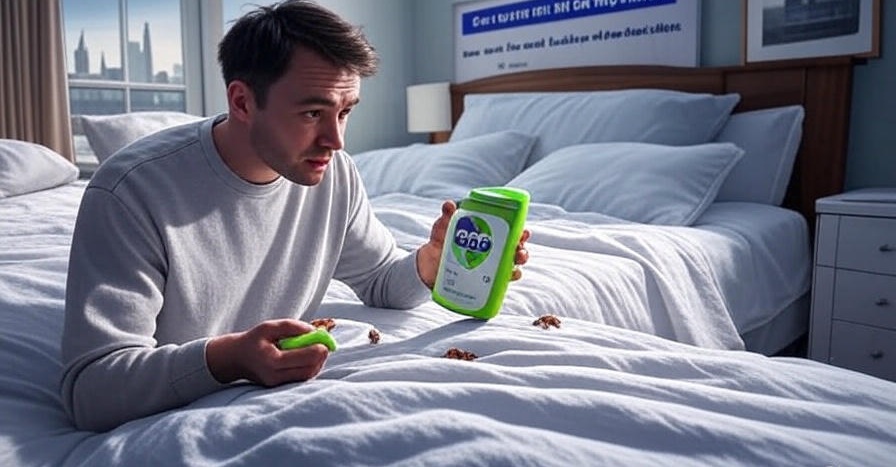Introduction
Bed bugs are a growing menace in London, turning peaceful homes into battlegrounds of itchy bites and sleepless nights. As infestations spike in 2025, many Londoners are reaching for household products like Dettol, hoping for a quick fix. But does Dettol kill bed bugs? In this article, we’ll explore whether this popular disinfectant works against bed bugs, highlight its limitations, and explain why professional solutions from ThermoPest are the safest and most effective way to reclaim your home.
What Are Bed Bugs and Why Are They a Problem?
Bed bugs are small, reddish-brown insects that feed on human blood, typically at night. They’re experts at hiding in mattresses, bed frames, and even clothing, making them tough to spot until the bites appear. In a bustling city like London, bed bugs spread easily through public transport, hotels, and shared spaces, hitching rides on bags or coats.
The Challenges of Bed Bug Infestations
Bed bugs are prolific breeders. A single female can lay up to 500 eggs, each tiny enough to fit in the smallest crack. Their resilience—surviving months without food and resisting many chemicals—makes DIY solutions like Dettol tempting but often futile.
A Londoner’s Tale
Take Lisa, a London student who found bed bugs in her flat after a trip. She sprayed Dettol on her bedding, thinking it would solve the problem. The bugs persisted, and Lisa later wished she’d sought professional help from the start.
Does Dettol Kill Bed Bugs?
So, does Dettol kill bed bugs? The answer is partially yes, but it’s not a practical solution. Dettol, a household disinfectant, can kill bed bugs on direct contact by disrupting their exoskeleton or overwhelming their system. However, this only works if you spray the bugs directly, which is nearly impossible given their knack for hiding.
How Dettol Affects Bed Bugs
Dettol’s active ingredients, like chloroxylenol, are designed to kill bacteria and some pests on surfaces. When sprayed on a bed bug, it can cause immediate harm, leading to death. But bed bugs tucked away in furniture seams or wall cracks remain untouched, and Dettol has no residual effect to kill bugs that emerge later.
Limitations of Dettol
Even if you manage to hit a few bugs, Dettol won’t reach eggs or hidden adults, allowing the infestation to rebound. Its strong smell may also repel bed bugs, causing them to scatter and spread the problem. Plus, Dettol isn’t designed for pest control—overuse can damage fabrics, irritate skin, or cause respiratory issues, especially in poorly ventilated spaces.
Risks of Using Dettol for Bed Bug Control
Relying on Dettol is risky. Beyond its limited effectiveness, it poses health and practical concerns. Spraying it on bedding or furniture can leave chemical residues, and the NHS warns against using unapproved products for pest control due to potential health hazards.
Health and Safety Issues
Dettol can irritate eyes, skin, and lungs, particularly for children, pets, or those with asthma. Repeated use in a bedroom can create an unhealthy environment, trading one problem for another.
The Bigger Picture
Lisa’s story highlights the downside of DIY fixes. Her Dettol experiment not only failed but also delayed proper treatment, allowing the infestation to spread to her sofa and wardrobe, making the eventual cleanup more costly.
Safe and Effective Alternatives with ThermoPest
If Dettol isn’t the answer, what is? Professional pest control offers a reliable, long-term solution. At ThermoPest, we use advanced heat treatment to eliminate bed bugs at every life stage—eggs, nymphs, and adults—in just one visit. Our eco-friendly approach is safe for your home and family. Discover more on our bed bug treatment page.
The Power of Heat Treatment
Our heat treatment raises temperatures to 49°C–60°C, a range lethal to bed bugs. Unlike Dettol, heat penetrates deep into mattresses, furniture, and walls, ensuring no bug survives. It’s chemical-free, so you can return home the same day with no lingering odours or residues.
Why ThermoPest Stands Out
With years of experience in London, ThermoPest combines cutting-edge technology with local expertise. We offer a 60-day warranty, transparent pricing, and tailored solutions for flats, houses, or businesses. Our goal? To give you peace of mind and a bug-free home.
Conclusion
While Dettol may kill a few bed bugs on contact, it’s not a safe or effective way to tackle an infestation. For lasting results, skip the DIY myths and trust the professionals. If bed bugs are disrupting your life in London, contact ThermoPest for a free consultation. Let us help you sleep soundly again.
Additional Resources
For more on bed bugs, visit the NHS bedbug guide. To explore our services, check out our bed bug treatment page or the ThermoPest main website.


